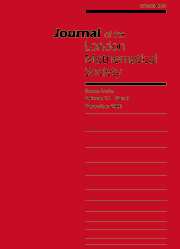Article contents
ADMISSIBLE ARRAYS AND A NONLINEAR GENERALIZATION OF PERRON–FROBENIUS THEORY
Published online by Cambridge University Press: 01 December 1998
Abstract
Let Kn ={x∈ℝn[ratio ]xi[ges ]0 for 1[les ]i[les ]n} and suppose that f[ratio ]Kn→Kn is nonexpansive with respect to the [lscr ]1-norm and f(0)=0. It is known that for every x∈Kn there exists a periodic point ξ=ξx∈Kn (so fp(ξ)=ξ for some minimal positive integer p=pξ) and fk(x) approaches {fj(ξ)[ratio ]0[les ]j<p} as k approaches infinity. What can be said about P*(n), the set of positive integers p for which there exists a map f as above and a periodic point ξ∈Kn of f of minimal period p? If f is linear (so that f is a nonnegative, column stochastic matrix) and ξ∈Kn is a periodic point of f of minimal period p, then, by using the Perron–Frobenius theory of nonnegative matrices, one can prove that p is the least common multiple of a set S of positive integers the sum of which equals n. Thus the paper considers a nonlinear generalization of Perron–Frobenius theory. It lays the groundwork for a precise description of the set P*(n). The idea of admissible arrays on n symbols is introduced, and these arrays are used to define, for each positive integer n, a set of positive integers Q(n) determined solely by arithmetical and combinatorial constraints. The paper also defines by induction a natural sequence of sets P(n), and it is proved that P(n)⊂P*(n)⊂Q(n). The computation of Q(n) is highly nontrivial in general, but in a sequel to the paper Q(n) and P(n) are explicitly computed for 1[les ]n[les ]50, and it is proved that P(n)=P*(n)=Q(n) for n[les ]50, although in general P(n)≠Q(n). A further sequel to the paper (with Sjoerd Verduyn Lunel) proves that P*(n)=Q(n) for all n. The results in the paper generalize earlier work by Nussbaum and Scheutzow and place it in a coherent framework.
- Type
- Notes and Papers
- Information
- Copyright
- The London Mathematical Society 1998
- 2
- Cited by


